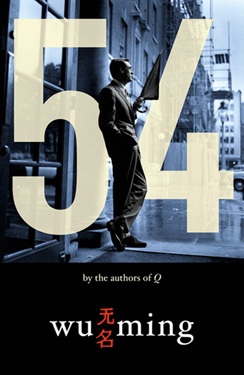 Novel 54 Novel 54Wu MIng 2005 Wu Ming’s novel 54 (English translation 2005 by Simon Whiteside) is an unusual experiment in collective authorship—the writers are five Italian author-activists. But you shouldn’t read it because it’s an interesting concept; read it because it’s an entertaining novel that successfully embraces satire, tragedy, and political commentary. It is set in the year 1954 and weaves together multiple narrative strands that investigate the realities of postwar Italy and Yugoslavia, as well as that era’s creeping Hollywoodization of the non-American world. Characters range from partisan and communist fighters in WWII, to young Italians with few prospects, to mobsters who have been (literally) lifted straight from the movies, to Tito and Cary Grant. Bit players include MI6 and KGB agents, as well as a television set: a McGuffin Electric Deluxe that has found itself in Italy, and that feels insufficiently appreciated by the locals (part of the novel is narrated from its perspective). And yes, Wu Ming is fully aware of the connotations of using a “McGuffin” as a plot device, since Alfred Hitchcock makes an appearance in 54, too (although one of the mob hangers-on persists in believing that he is actually Winston Churchill). The plotline that may be most appealing to an audience in 2012 involves young Pierre Capponi, whose socioeconomic position closely parallels that faced by many young adults in Europe and North America today. Pierre finds himself in his early twenties in a country that has no promising employment prospects for him or his friends, and in which you need connections to secure basic work at a local bar. His girlfriend is married to an older doctor who can provide for both her and her PTSD-afflicted brother. Pierre’s frustration with his stagnant life ultimately leads him down strange and sometimes criminal paths, and gives us a visceral understanding of how and why populist revolutions (including communist ones) happen. Wu Ming was prescient, for 54 was completed in 2001, well before the current economic crash, but the novel reminds us that the historical questions and predicaments of the postwar years have far more staying power than we may like to think. For more information about Wu Ming visit the Wu Ming Foundation. Amy Mitchell has a PhD in Modernist poetry from Western University. She is currently a Professor of English and Writing at Fanshawe College.
|
RUSTY RECOMMENDS
In the spirit of supporting writing—especially writing that's off the radar or under appreciated—we want to know what you are excited about reading and what you think we should be reading. Your recommendations should be paragraph length (approximately 250 to 300 words) and should briefly summarize the book and detail why you are recommending it or why you think others should read it. Send our reviews editor Aaron Schneider your recommendations of Canadian and International fiction and poetry. Please write "Rusty Recommends" in the subject line. Include your (250 to 300 word) recommendation, name, and a link to your website, blog, or social media site (if you have one). Selected recommendations will be posted on our website. We will contact you if your recommendation is selected for publication. There is no payment for publication of Rusty Recommends. Archives
July 2015
Categories
All
Rusty Recommends Editor:
Dr. Aaron Schneider completed a PhD. in Canadian Literature at Western University where he currently teaches courses in public speaking, political rhetoric and Canadian Literature. He is excited about bringing together his interests in World and Canadian Literature. He is the co-founder and co-editor of The Rusty Toque and Western's online student journal Occasus. |

 RSS Feed
RSS Feed
